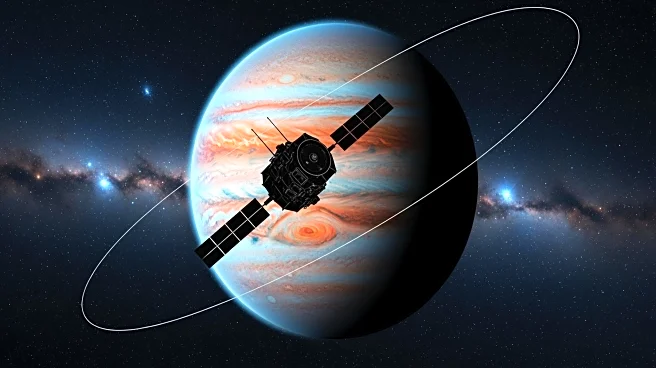What's Happening?
Harvard astronomer Avi Loeb has proposed that the interstellar object 3I/ATLAS, currently on a path through the solar system, might be an alien spacecraft. Loeb's theory suggests that the object could
be releasing technological devices around Jupiter, a hypothesis that has sparked debate within the scientific community. The object is expected to pass close to Jupiter's Hill radius, a region where the planet's gravitational influence is strongest. Loeb argues that recent non-gravitational acceleration of 3I/ATLAS could indicate the presence of an internal engine, rather than the conventional explanation of solar radiation causing mass loss. NASA, however, maintains that 3I/ATLAS is likely a comet composed of ice and dust, dismissing Loeb's claims.
Why It's Important?
The debate surrounding 3I/ATLAS highlights the ongoing discussion about the possibility of extraterrestrial technology within our solar system. If Loeb's hypothesis is correct, it could have profound implications for our understanding of alien civilizations and their interest in our solar system. The potential discovery of technological devices around Jupiter would challenge current scientific paradigms and could lead to increased interest and funding in the search for extraterrestrial intelligence. On the other hand, if the object is confirmed as a natural comet, it would reinforce existing theories about interstellar objects and their behavior.
What's Next?
As 3I/ATLAS approaches Jupiter, NASA's Juno spacecraft, which has been orbiting the planet since 2016, may provide further insights into the object's nature. Loeb has called for a closer examination of 3I/ATLAS during its approach to determine whether it is indeed releasing technological devices. The scientific community is likely to continue scrutinizing the object, with potential implications for future research and exploration missions. The outcome of this investigation could influence public and scientific interest in extraterrestrial phenomena.
Beyond the Headlines
Loeb's theory raises questions about humanity's place in the universe and the possibility of advanced civilizations beyond Earth. The idea that Jupiter, rather than Earth, might be of interest to extraterrestrial beings challenges anthropocentric views and could shift perspectives on our significance in the cosmos. This debate also touches on the broader issue of scientific humility and the importance of remaining open to unconventional ideas in the pursuit of knowledge.









